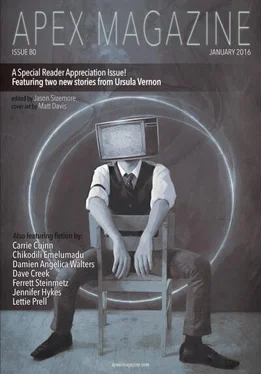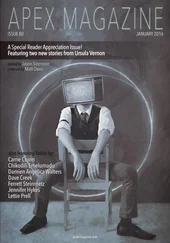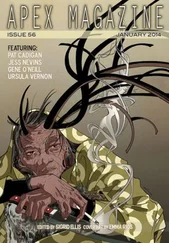Ursula Vernon - The Tomato Thief
Здесь есть возможность читать онлайн «Ursula Vernon - The Tomato Thief» весь текст электронной книги совершенно бесплатно (целиком полную версию без сокращений). В некоторых случаях можно слушать аудио, скачать через торрент в формате fb2 и присутствует краткое содержание. Жанр: Фэнтези, на английском языке. Описание произведения, (предисловие) а так же отзывы посетителей доступны на портале библиотеки ЛибКат.
- Название:The Tomato Thief
- Автор:
- Жанр:
- Год:неизвестен
- ISBN:нет данных
- Рейтинг книги:4 / 5. Голосов: 1
-
Избранное:Добавить в избранное
- Отзывы:
-
Ваша оценка:
- 80
- 1
- 2
- 3
- 4
- 5
The Tomato Thief: краткое содержание, описание и аннотация
Предлагаем к чтению аннотацию, описание, краткое содержание или предисловие (зависит от того, что написал сам автор книги «The Tomato Thief»). Если вы не нашли необходимую информацию о книге — напишите в комментариях, мы постараемся отыскать её.
The Tomato Thief — читать онлайн бесплатно полную книгу (весь текст) целиком
Ниже представлен текст книги, разбитый по страницам. Система сохранения места последней прочитанной страницы, позволяет с удобством читать онлайн бесплатно книгу «The Tomato Thief», без необходимости каждый раз заново искать на чём Вы остановились. Поставьте закладку, и сможете в любой момент перейти на страницу, на которой закончили чтение.
Интервал:
Закладка:
And it’ll give me the runs, too, like as not.
The bird was nowhere to be seen. The hillside was an intricate pattern of white powdered earth between dark green scrub.
The first cicada began to buzz, and its brethren chimed in, until the air was a long rattling hiss of heat.
There were two long metal rails across the ground on the opposite hillside. A little green scribble of a weed had grown up along the slope, but nothing grew between the tracks.
When she breathed in, she could smell it faintly—the hot gunmetal smell of the train-god.
The tracks ran off toward the horizon. The burning mockingbird was nowhere to be seen.
Grandma exhaled. “Well,” she said. She spoke out loud, so the tracks could hear her, just in case something was listening. “Well. Guess it’s time to go pay a call on the Mother of Trains.”
She walked back into town, which took long enough to convince her that she didn’t want to walk clear to the train station. She swung by her house, fed Spook-cat, and left a note for Eva. Then she set out for the stable.
It was a good stable, kept clean, and it was run by a man named Tomas, who had gotten tomato seeds from Grandma Harken on three separate occasions. This was a rare benediction, and he was careful not to take it for granted.
“I need your old mule,” Grandma Harken told him. “The one I like to ride.”
Tomas looked at her, gazed briefly heavenward, and said, “That mule died five years ago, Abuela Harken.”
Grandma blinked. “What’d he die of?”
“Old age,” said Tomas, who was always extremely respectful but had a sense of humor anyway.
“Huh!”
After a minute she said, “What’s the next oldest mule you got?”
“I’ve got a young mule,” said Tomas, “who’s as polite a girl as you’ll ever meet. And you are welcome to ride her, Abuela.”
“I like the old ones,” said Grandma, disgruntled.
“She’ll get old in due time.”
Grandma glared at him. Tomas contrived to look innocent.
“Fine,” said Grandma. “But she better have good manners.”
“She has better manners than my sons, Abuela.”
Grandma muttered to herself. Tomas had two sons, who were polite and respectful and built like bulls and who would spend hours splitting firewood for an old lady. These were things you learned to appreciate when you were Grandma Harken’s age.
The mule was indeed very well-mannered. She pricked her ears up and lipped delicately at Grandma’s sleeve.
“Good girl,” said Grandma, petting her nose. “Is she smart?” she asked Tomas.
“She’s a mule.”
“I’ve known some stupid mules.”
“A stupid mule is still smarter than a good horse or a bad man.”
Grandma sighed. It can be annoying when other people are right.
She loaded water bottles onto the mule and climbed on.
The mule waited politely— Is this everything? That’s all? —then set out. Grandma clicked her tongue and flipped the reins, setting her on the road to the next town over.
The one that had a train station.
The desert was full of strange things, but the trains were some of the strangest.
When white men came to lay iron rails across the land, the land didn’t take kindly to it. The train tracks looked too much like chains. The land brought heat and death and disease, and work on the rails slowed to a crawl.
“So they brought us to die instead,” said Grandma’s friend Anna. “From Canton to San Francisco and out to here.” She swept her hands when she said it, taking in the province across the ocean that she had never seen, and the desert where she had lived all her life.
That was the truth of history. Hundreds came and thousands died and hundreds more came to replace them. The blood of Anna’s people had bathed every inch of the rails.
When the train-gods woke, it was no wonder who they chose to be their priests. Chinese, black, Irish—even a Cornish woman way up north, where the snow piled up everywhere but on the tracks. People who had, with toil and tears, earned the gods’ regard.
It had made a lot of big money men back east furious. They thought they’d owned the railroads. They had the pull to get the army brought out to try and bring the machines back under their control.
The train-gods only had to eat a couple of regiments before they realized their mistake.
Lotta damn foolishness, Grandma Harken thought. People ought to be a lot quicker to listen to each other and a little slower to listen to something that calls itself a god.
She wouldn’t have said that out loud, though. She didn’t want it getting back to a train, or worse yet, to Anna.
Anyway, the system worked. You could get a train from one side of the country to the other, though it wasn’t always the same train or even the same country out the windows. Freight got moved, more or less. Sometimes it wound up in the wrong place or was summarily dumped in the middle of nowhere. The machines were capricious gods. (This was part of the reason for the price of coffee.)
They were very good about letters, though. Anna’s grandson was the current train-priest, and he said that his god thought letters were prayers and moved them as a kind of professional courtesy.
You appreciated that sort of thing in a god.
Grandma Harken could afford to be a little detached. Her people hadn’t been involved one way or the other. It had all been long, long before her time.
It’d been a good bit before Anna’s time too, truth be told, but Anna had an image to maintain.
Neither Anna nor any of her grandchildren could have said what bargain the train-gods struck with the desert, though.
That there was a bargain was undeniable. Grandma Harken herself had noticed that the tracks took some odd turns sometimes, to avoid a wash or a particular stone—turns that no human would have introduced to the line. And it was true that you could walk the rails until you died of thirst, and you’d never see the shadow of a saguaro lying over the tracks.
What it all meant, though, Grandma left for others to decide. The bargain was between the desert and the trains, and no business of any mortal creature at all.
Anna looked old. She was younger than Grandma Harken—probably—but neither of them were quick to compare.
She lived in a house alongside the train station. It was an old adobe, same as all the other houses in town, but it had a brightly painted balcony on the second floor and faded lanterns hung from the ends of the corner beams.
One of her grandchildren—or great-grandchildren, Grandma wasn’t sure, and after the bit with the mule, she’d rather not find out—opened the carved wooden door and let Grandma Harken inside. Anna was sitting in a chair in one corner of the room, her feet up on a stool.
“Harken?” she said. “Is that you, you old jackrabbit?”
“Last I looked,” said Grandma Harken. “You still alive?”
“Looks that way. Come in.” She waved to the grandchild and a chair was produced. “What brings you here?”
“Need an answer, and maybe a favor.”
Anna raised an eyebrow. She had very little left in the way of eyebrows, but her face was so wrinkled that the gesture remained effective. “If you’ve come to ask for a train to fetch your grandson home, I’d advise against it.”
“Lord, no!”
Anna relaxed. “Glad to hear it. I’m still surprised we didn’t have some broody little babies around here nine months later.”
“He didn’t brood as a baby.” Grandma paused, remembering. “Well. Much.”
Anna laughed.
“Sit, sit. Have you eaten? Are you thirsty?”
Читать дальшеИнтервал:
Закладка:
Похожие книги на «The Tomato Thief»
Представляем Вашему вниманию похожие книги на «The Tomato Thief» списком для выбора. Мы отобрали схожую по названию и смыслу литературу в надежде предоставить читателям больше вариантов отыскать новые, интересные, ещё непрочитанные произведения.
Обсуждение, отзывы о книге «The Tomato Thief» и просто собственные мнения читателей. Оставьте ваши комментарии, напишите, что Вы думаете о произведении, его смысле или главных героях. Укажите что конкретно понравилось, а что нет, и почему Вы так считаете.









